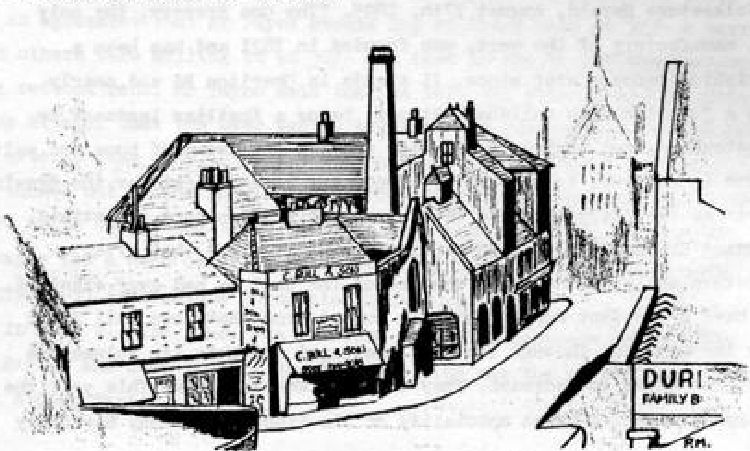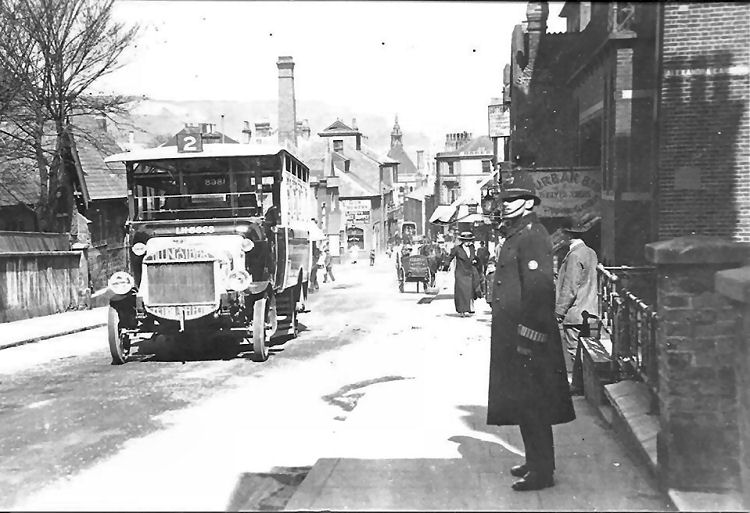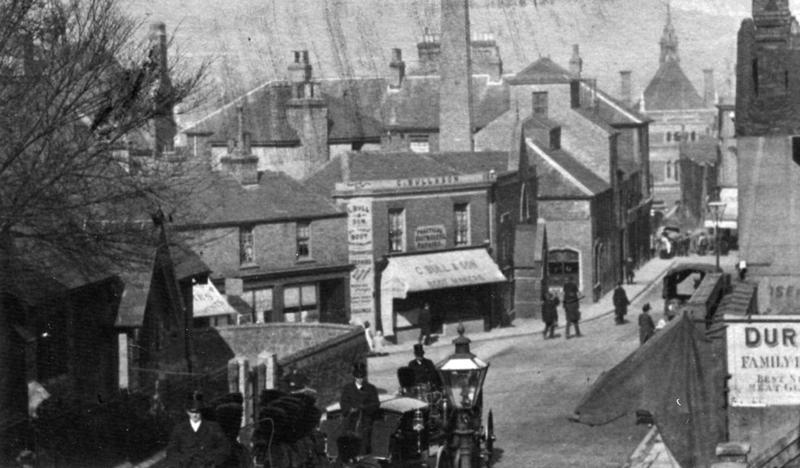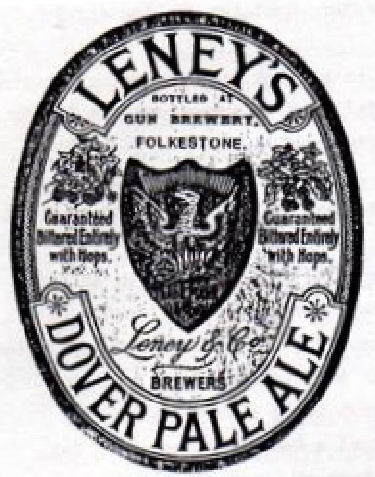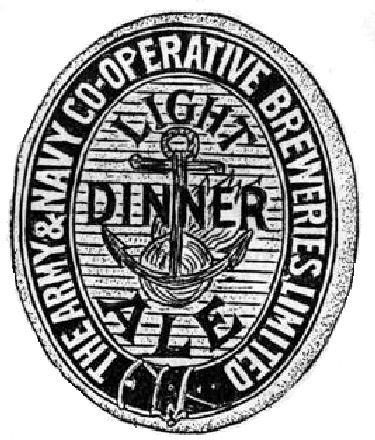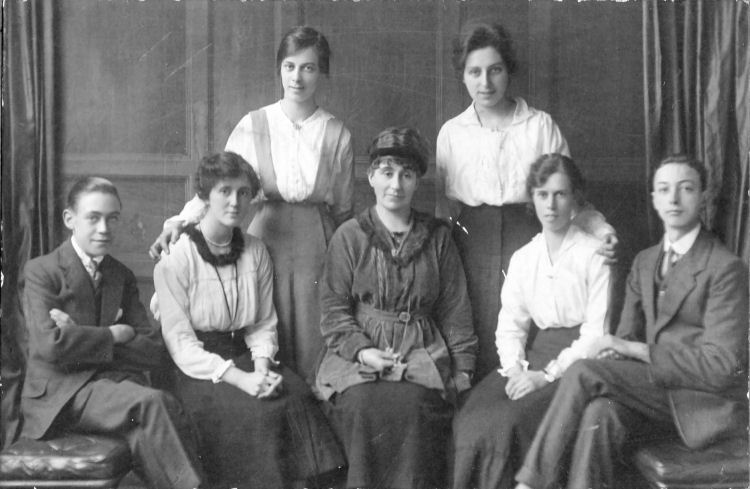Page Updated:- Sunday, 07 March, 2021. |
||||||||||
| LIST | BREWERIES | Jan Penderson and Paul Skelton | ||||||||
|
|
Gun Brewery |
|
||||||||
|
Folkestone
The name of the brewery was derived from a gun sent to Folkestone during the Napoleonic Wars as a defence against attack. It is said it blew up upon firing and was then used as a corner post at the junction of Cheriton Road and Guildhall Street, giving its name to the area. Just after the turn of the Century it was moved to the Leas and was finally taken for scrap during World War Two. On September 10th 1815, Mr. Ham Tite, Exercise officer, was married at Ealham to Miss Anne Poole, the daughter of Mr. Daniel Poole, Grocer. In the Kentish Gazette of 5th march 1816 there appears an advertisement; for sale at Faversham, for ready money only, good pale and amber malt for 7/6d. a bushel by H. Tite. In 1844 Ham Tite leased some ground in Cheriton Road, Folkestone from Lord Radnor and had built his brewery and the "Shakespeare Inn" in 1846. I Directory for the following year lists Hame Tite as a maltser and his son, George Ham Tite (born at Ealham in 1917) as a Brewer. From 1855 George is both brewer and maltser until 1870 when he retired the post of brewer to his son William. January 1870 saw the Town Council discussing the Bayle Pond which was supplied with water by the town dyke. This water was to be conserved but many people were diverting it for their own use. The Council were to look into this matter and report back. In February the town dyke was discussed again and it was revealed that Alderman Tite was the worst offender - his brewery had a tank holding 20,000 gallons of water which had been taken from the town dyke, and he had been doing so for years. It was time this was put to. (Folkestone Chronicle.) On June 17th 1871 in a County Court case heard before judge W. C. Scott, George Ham Tite brought an action against Henry Payne for the recovery of the "Shakespeare Inn." In 1870 he had let the Inn to his son William for £40 a year. He in turn had underlet it to Henry Payne for £24-10-0 a year plus an extra £2 a year for fixtures. There was an argument that Mr. Payne should buy Mr. Tite's beer at 32/- a barrel when others were selling it at 30/- and that is why he got the "Shakespeare" at a reduced rent. Mr. Payne said that he left off dealing with Mr. Tite as he alleged that the beer was so bad that his customers could not drink it. After a long case, of which this is just the skeleton, Mr. Payne was turned out of the Public House. Previous to this the case had been to Court twice before and there had also been a case between W. Tite and H. Payne for a debt owing for beer supplied by W. Tite's brewery amounting to £19-10-6. (Folkestone Chronicle, 24th June, 1871.) In 1875 W. Tite junr. was landlord of the "Shakespeare" and W. Tite was brewer and Corn Factor. In 1877 John Tite was the brewer and W. Tite just a Corn Factor. Malting ceased when the Brewery was taken over by Clement Cowell in the middle of 1880. By September of that year "the Steam Brewery" was offering as a speciality, "Guinea Ale," a dinner ale, at 21/- for 18 gallons. He was also selling "Bright Bitter" and "Mild Ales" at 1/- per gallon, "India Pale Ale" at 1/6, "Porter" at 1/-, and "Double Stout" at 1/6. He also sold hops, fresh yeast, and corks, offered a range of bottled beers and even delivered. In January 1882 a Martin Henry secured a lease on the Malthouse from Mr. Tite for use in connection with the YMCA and in march the Emmanuel Mission Church moved into part of the premises. December of that year saw the death of Ham Tite at the grand old age of 93, he had served on Folkestone Council for 20 years, 12 as an Alderman, and had retired in 1871. By 1884 the partnership of Nickoll and Furner were in control but English's Guide to Folkestone for 1886 contains the following ad:- G. BELGRAVE FOLKESTONE ALES, STEAM BREWERY, CHERITON ROAD, ESTABLISHED 1821. Established dates are notoriously unreliable but it is believed that 1821 may be the date at which Ham Tite commenced brewing in Folkestone, probably at premises in Rendezvous Street until 1846. The name reverted to the Gun Brewery by 1887 and over the next 8 years the Brewery built up a reputation for brewing quality ales. The Folkestone Herald of December 15th, 1894 quote the Country Brewers Gazette report of a Brewers Exhibition at the Agricultural Hall, Islington in the previous October. "Mr. George Belgrave, of the Gun Brewery, Folkestone, sent a pale ale which was in splendid order and had all the characteristics of the best Kent productions." Folkestone Herald, August 17th, 1895. "The Gun Brewery, the only local manufacture of the sort, was founded in 1821 and has been a flourishing concern ever since. It stands in Cheriton Road and nearly forms a junction with Guildhall Street, being a familiar landmark to Folkestone, and during the brewing process the aroma of hops and malt is much in evidence to passers by. The water is excellent for the brewing of beer as they have analyses of it constantly by eminent scientists, including Mr. Harland, well known expert, who declared that after exhaustive analysis the water was on of the best he had ever examined. They have a constant supply which is pumped from their own well 108ft below the surface. Through the most prolonged droughts its volume has never been known to decrease. They use only English hops. This year the Brewery is making a great speciality of its Stout which they have only just begun to manufacture after considerable demand from their customers and which they hope to make a leading brand although they did offer other stouts. In the cellars below, in a good atmosphere, were numerous hogsheads of Barley Wine. In the bottling house a number of men and boys busied themselves in bottling and casking. The brewery also had 1 gallon stone jars which they hoped to develop. Other parts of the Brewery contained mash tuns, granaries, and engine rooms." A report of the Brewster Sessions in the Folkestone Herald, 31st August 1895 tells us of the landmark in the history of the Brewery. "At the renewing of Licensing for the year Mr. F. Hall, Solicitor, applied on behalf of the proprietor of the Gun Brewery. The License had formerly been granted to George Belgrave, but he had sold the premises a week or two ago to another Gentleman. Mr. Rogers was still the Manager for the new proprietor and the License was granted for the time being in Mr. Rogers name." In fact a new company had been formed to acquire The Gun Brewery and the Friar Brewery, Aldershot. They took over on 1st October 1895 and on the 12th were advertising:- "Army and Navy Cooperative Breweries Ltd., Effingham House, Arundel Street, Strand, W.C.2. The Directors, having acquired the Breweries in Aldershot and Folkestone, invite further subscriptions for 20,000 ordinary shares at £1 each. Managers of Service Clubs, Messes, Canteens etc., wishing for price lists of Wines, Ales, Spirits, and Tobacco are requested to apply to the Manager. In mid 1898 the Gun Brewery was sold to "Alfred Leney & Co. Ltd.," of Dover and brewing ceased. It is believed that production continued at Aldershot until late 1899. The Folkestone Herald of July 2nd reports:- "Messrs. Leney & Co., the well known Brewers of Dover, whose name is honoured as a household word throughout Kent, have lately acquired the Gun Brewery and the adjoining "Shakespeare Inn" in this town. The enterprise will be followed by great improvements in the future. The Gun Brewery will be used as stores, and this central position will be of estimable benefit to their customers. "Leney's" Kentish Ales and Stouts are famed the world over for their undoubted purity and are recommended on this account by the Faculty and the medical newspapers. "Leney" spells genuineness all over Kent and having this in mind we cordially wish the firm every success in their new venture." After many changes of ownership and fortunes the Gun Brewery had now produced its last beer. "Leney's" continued bottling beer and later mineral waters until 1922 when Mr. Herbert Tite, who was still the leaseholder of the premises sold out and the buildings were converted into shops. The site was levelled in 1972 to become a part of the one-way traffic system and the only remains of the Brewery are a series of archways in the wall of a motorcycle shop below the Catholic Church.
THE GUN BREWERY, FOLKESTONE One of the difficulties in researching the history of bygone breweries is the fact that only sketchy records of these exist. This means that few short cuts are available, so it becomes necessary to read through the local newspapers of the time in the hope of finding the facts. My thanks go to the staff of the Reference Library, Folkestone for their patience and help in preparation of this article. In 1844 Ham Tite, brewer and maltster, late of the Broad Street Brewery. (the remains which can be seen on the old Plummer Roddis site between Rendezvous Street and the Old High Street) leased some ground from Lord Radnor in Cheriton Road. In 1846 he had the Gun Brewery and the "Shakespeare Inn" built. Ham Tite continued his occupation as maltster, while his son George Ham Tite was brewer, and the census of 1851 shows him employing 2 men. He continued as brewer and maltster until 1870, when brewing was handed over to his son, William. In January of that year the town council discussed the Bayle Pond, which was supplied with water from the Town Dyke. This water was to be conserved, but many people were diverting it for their own use. A party was appointed to look into this matter and report back. This was duly done and the findings were that a Council Alderman - Ham Tite - was the biggest offender. His brewery had a tank holding 20,000 gallons of water taken from the town dyke. He had been doing this for years and it was high time this was put a stop to. June of 1871 saw the company in the news again. On the 17th in a county court case heard in the town George Ham Tite brought an action against Henry Pain to recover possession of the "Shakespeare Inn." In 1870 G. H. Tite had made an agreement with his son William to let the pub to him for £40 a year. He in turn sub-let it to Mr. Payne for £24-10-0 plus £2 a year for the fixtures. The reason Mr. Payne got the house at reduced rentage was that he had also agreed to take William Tite's beer at 32/- a barrel, 2/- above formal prices. Mr. Payne told the court he had had to leave off dealing with William Tite as he alleged the beer was so bad that his customers could not drink it. After a lengthy case the court found in favour of the brewers and Mr. Payne was turned out of the pub. He seems to have been a troublesome tenant, as he had previously been in court on a charge of failing to pay for beer received, stating that it had never been delivered. Who took over the pub is not known, but by 1875 it was occupied by William Tite's son William. By 1877 brewing had been handed on to William Tate's other son, John. Malting ceased at the Gun Brewery when it was taken over by Clement J. Cowell in the middle of 1880. In September of that year, having renamed the brewery "The Steam Brewery", he was advertising his "Guinea Ale", a dinner ale which sold at 18 gallons per guinea. He was also selling bright Bitter and Mild ales at 1/- per gallon, India Pale Ale at 1/6, Porter at 1/- and Double Stout at 1/6. By January of 1881 he was selling his Light Ale, Bitter, Mild and Porter at 11d per gallon for cash sales. By May 1881 he had launched yet another beer. His Tonic Pale Ale was priced at 8/3 for 9 gallons. For the next few years nothing much is known about what happened at the brewery, except that the Folkestone Guide for 1884 lists Nicholl & Furner as owners, so we can assume that the takeover was in 1883. By the time the guide was published for 1886 there had been yet another change, George Belgrave having taken over the concern. He stayed in operation at the Gun for 9 years, during which time his ales grew in popularity. The quality of the beer certainly seems to have improved since the time of William Tite as the County brewers Gazette reported in 1894 : At the Brewers Exhibition held on 24/10/ 1894, Mr. George Belgrave, Gun Brewery, Folkestone, sent a Pale Ale which was in splendid order and had all the characteristics of the best Kentish productions. In August 1895 a local reporter paid a visit to the brewery, but in his report told little about the layout of the brewery itself. He did, however, tell that the water used for the brewing, which was pumped from their own well 108ft. below ground, had been examined by various experts and declared to be one of the best for brewing. Only English hops were used for beers, and the company were making a great speciality of their stout, which was in great demand. They had also started using 1 gallon stone jars for the home trade, a market which they hoped to develop. The report makes no mention of the fact that here was to be yet another change in ownership at the brewery. A fortnight after it appeared, when the licenses for that year were being renewed at the Brewster Sessions, it was revealed at Mr. Belgrave had sold the premises a week or two previously to another gentleman. Mr. Belgrave's manager, Rogers, was still manager of the new owners, and the license was renewed for the time being in his name. The Army and Navy Co-operative Breweries Ltd. who took over the Gun Brewery from Belgrave's on 1st October 1895. The colouring of the label is black on a blue backing.
THE GUN BREWERY, FOLKESTONE PART 2 by JAN. PEDERSEN The new owners of the Gun Brewery turned out to be the Army and Navy Co-operative Breweries Ltd. who took over the brewery on 1/10/1895. The company had been formed to take over the Gun and also the Friary Brewery Co. of Aldershot. Within a fortnight an advert had appeared in the local press inviting subscriptions for 20,000 ordinary shares of £1 each. The previous owner, Belgrave's stone jars were still in use for I.P.A. and Double Stout at 1/6 per gallon, Light Bitter Ale and Porter at 1/-. Their draws delivered hourly throughout Folkestone and Sandgate. The following year saw a further invitation for share capital and a confident statement that the brewery was likely to develop into an important and remunerative business owing to the proximity of Shorncliffe Camp and other garrisons. During the year there was a change of manager, Mr. H. S. Hutching taking over. In May of 1897 the brewers appeared in the county court held in the town. They had brought an action against Joseph Henry Burton for non-payment of an account for spirits supplied. Burton had until recently been a publican, at the "Tramway Tavern," but had been given notice to quit by George Beer & Co. of Canterbury who owned the pub. The court found in favour of the Army & Navy and made an order for payment of 4/- per month. Just how Burton was expected to pay even this small amount is not clear because he was a man in trouble. While he had been at the "Tramway Tavern" he had received no wages, only the profits on what he sold, which came to about 18/- a week. The reason he had been given notice by Beer and Co. was a court case a fortnight previously, in which he had been prosecuted by the police for selling beer from Martello Tower No. 1 on the Warren. He told the court he had no idea that his license only covered him for the "Tramway Tavern." At this time there was a great deal of work going on at the Warren in connection with the Channel Tunnel and there were several hundred men employed there. He had hired the tower from the Government for use as a store to supply the workers, and as they were hard workers it was only natural that they should require beer. He certainly seems to have spared no efforts for them as on the morning of the police raid he had been selling beer at 7 a.m. The police said that although he had stores of pasties, bread and cheese, there was no doubt about his main sale. There had been no licensed premises nearer than Radnor Street or North Street since the "Warren Inn" had had its license removed a few years previously. The defence said that there had been no attempt at concealment, and there had even been a delivery od beer on the morning in question. He appealed to the magistrates to let Burton off with a small fine. The Bench Chairman stated that having listened carefully to the case, which after all was a very serious offence, he could not believe that Burton was ignorant of the law. The very fact that it was not Beer & Co. who supplied the ale, but Chapman of Ashford, showed that he knew what he was doing. The beer was confiscated and Burton was fined £15 or 1 month's imprisonment. George Beer & Co. ordered him to quit the "Tramway Tavern." In September of 1897 the firm was again in court, this time to oppose an application for an off license for a shop opposite the brewery, suggesting that there was no public need for the license. The Chairman of the Bench considered the matter and the license was granted. The Bouleau Wine Co. opened up a few weeks later and presumably as a protest against the objection sold Stansfeld & Co's. ales. During that year the Army & Navy changed their manager again, Mr. H. Dorling taking over the post. In early 1898 the beers brewed at the Gun brewery were as follows:- Mild, Light Bitter, Bitter and Porter at 8/3 per firkin, Medium Bitter and Single Stout at 10/3 with India Pale Ale and Double Stout topping the range at 12/9. These prices amazingly had not only decreased from those in their original adverts, but had actually reverted to those in force during the time of Clement Cowell 17 years previously! The end, however, was soon to come for the Gun Brewery as a going concern. In June 1898 the Army & Navy Co-operative Brewery pulled out of Folkestone, although they kept the Aldershot end of the operation going. The Folkestone site was taken over by "Alfred Leney & Co." of Dover, who announced that although they would be making improvements at the site, the brewery would be used as stores and a bottling plant for their Dover brewed ale. After many changes of ownership and fortune the Gun Brewery had now produced it's last ale. Leney's continued bottling beer and later mineral waters there until the mid 1920s when some of the brewery was converted into shops. The site was levelled in 1972 to become part of Folkestone's one way system, and the only remains of the brewery are a series of dwarf archways in the wall of a motorcycle shop below the Catholic Church. As a footnote to the prices mentioned above, Fremlins were charging the following prices per pint in 1966: XX Mild 1/7, Tusker (then a mild) 1/11, 3 Star 1/9, 4X Bitter 2/2, and Draught County 2/7. 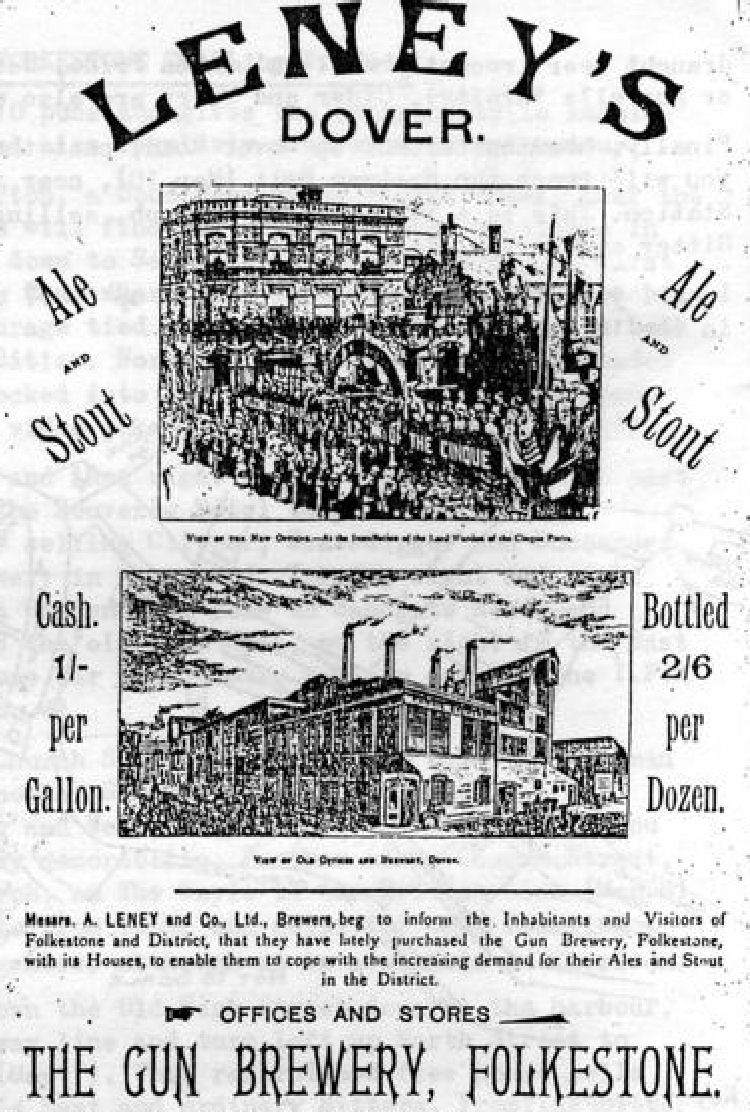
Above shows one of the last adverts to feature the Gun Brewery. It first appeared a fortnight after "Leney's" had taken over, but even by then the tone of the text makes it clear that the days of brewing in Folkestone were over. Alfred Leney & Co. were themselves taken over in 1926 by Fremlin's of Maidstone and they ceased brewing a year later. A beer bottling plant remained in operation and business also continued as Leney's Table Waters Ltd. until 1950. The brewery which stood in Dolphin Lane was demolished in 1965 and a multi-storey car park now occupies the site.
Gun Brewery owned by George Ham Tite.
Further reading http://evenmoretales.blogspot.co.uk
|
||||||||||
|
If anyone should have any further information, or indeed any pictures or photographs of the above licensed premises, please email:-
|
||||||||||
| TOP |
|
|
||||||||
